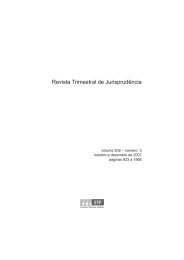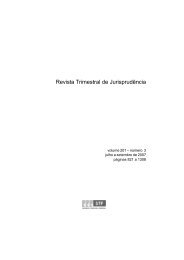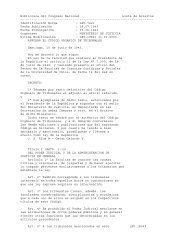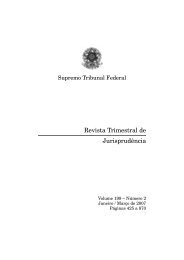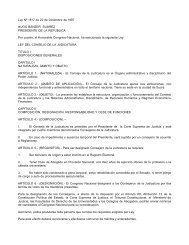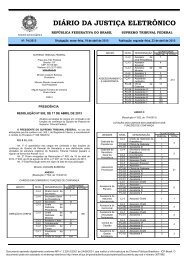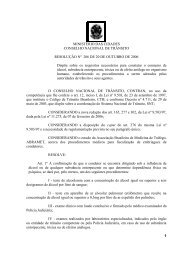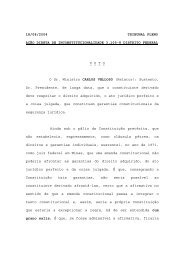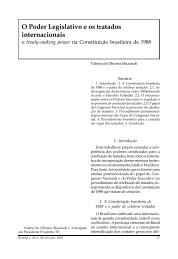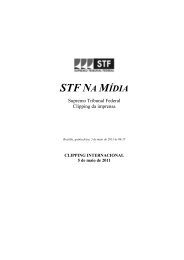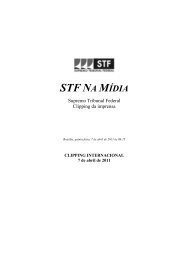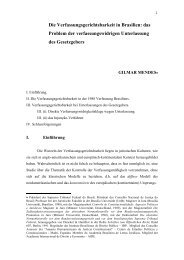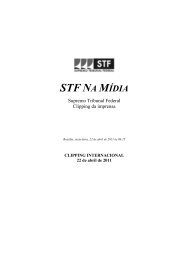STF NA MÍDIA
STF NA MÍDIA
STF NA MÍDIA
You also want an ePaper? Increase the reach of your titles
YUMPU automatically turns print PDFs into web optimized ePapers that Google loves.
victed for crimes during previous<br />
dictatorships, to absorb<br />
the lesson that the possibility<br />
of punishment is much greater<br />
than it was in the past.<br />
This may help explain why<br />
military coups are now so<br />
rare in the region.<br />
Likewise, the sight of Mr.<br />
Mubarak in a cage in a Cairo<br />
courtroom could deter government<br />
officials elsewhere<br />
in the region who are considering<br />
repressive measures<br />
against their populations.<br />
This may not help much with<br />
Mr. Bashir or President Bashar<br />
al-Assad of Syria, who<br />
are already deeply complicit<br />
in violent repression, and are<br />
unlikely to be deterred. But<br />
the history of dictators shows<br />
that some leaders cling to<br />
power at any cost, so it is<br />
hard to argue that the threat<br />
of prosecution is uniquely<br />
responsible for their continuing<br />
iron grip.<br />
This does not mean that all<br />
governments must immediately<br />
and simultaneously begin<br />
far-reaching prosecutions.<br />
The desire for justice is<br />
persistent, and if political<br />
conditions for prosecutions<br />
are not ripe immediately after<br />
a democratic transition, such<br />
prosecutions can be held later.<br />
Cambodia issued its first<br />
war-crimes conviction last<br />
year, over 30 years after the<br />
horrors of the killing fields.<br />
And domestic courts in Uruguay<br />
took 20 years to sentence<br />
the former authoritarian<br />
leader Juan María Bordaberry<br />
for human rights violations.<br />
Mr. Bordaberry died<br />
this summer in his home,<br />
where he was serving a 30-<br />
year sentence for ordering<br />
the murder of political opponents.<br />
It has never been easy for<br />
any country to confront its<br />
past. Almost all leaders,<br />
when faced with calls for<br />
accountability, have wanted<br />
to turn the page and look<br />
toward the future. But demands<br />
for justice are robust,<br />
and countries that have held<br />
former leaders accountable<br />
have in most cases come<br />
away stronger.<br />
Kathryn Sikkink, a professor<br />
of political science at the<br />
University of Minnesota, is<br />
the author of “The Justice<br />
Cascade: How human rights<br />
Prosecutions Are Changing<br />
World Politics.”<br />
JUSTIÇA NO EXTERIOR •<br />
THE NEW YORK TIMES (US) • INTER<strong>NA</strong>TIO<strong>NA</strong>L • 15/9/2011<br />
Steel Tycoon With Links to a Mubarak Is Sentenced<br />
By DAVID D. KIRKPA-<br />
TRICK AND HEBA A-<br />
FIFY<br />
CAIRO — An Egyptian<br />
Criminal Court sentenced<br />
the steel tycoon and former<br />
political power broker Ahmed<br />
Ezz to 10 years in prison<br />
and fined him the equivalent<br />
of about $11 million for corruption<br />
on Thursday, satisfying<br />
one of the most visceral<br />
demands of the revolution<br />
that toppled President Hosni<br />
Mubarak.<br />
To many, Mr. Ezz personified<br />
more than anyone else the<br />
political and economic corruption<br />
under Mr. Mubarak<br />
that enriched the politically<br />
connected few, leaving most<br />
Egyptians to sink deeper into<br />
poverty.<br />
The court also sentenced two<br />
less notorious Mubarak-era<br />
figures. The former minister<br />
of commerce, Rachid Mohamed<br />
Rachid, once considered<br />
a force for reform and<br />
clean government, was sentenced<br />
in absentia to 15 years<br />
in prison and a $230 million<br />
fine for illegally helping Mr.<br />
Ezz obtain permits for his<br />
steel empire — a more serious<br />
sentence perhaps reflecting<br />
the prominent public<br />
role he was convicted of abusing.<br />
It was the third sentence in<br />
absentia issued against Mr.<br />
Rachid, for a total of 35 years<br />
in prison. He left the<br />
country before Mr. Mubarak’s<br />
fall but has said he did<br />
nothing wrong. The stateowned<br />
newspaper Al Ahram<br />
reported last week that the<br />
Ministry of Interior had located<br />
Mr. Rachid in Qatar and<br />
was seeking his extradition.<br />
Amr Assal, a former head of<br />
Egypt’s Industrial Development<br />
Authority, was senten-<br />
S T F N A M Í D I A • 2 2 d e s e t e m b r o d e 2 0 1 1 . . . . . . . . . . . . . . . . . . . P Á G I N A 5 3



